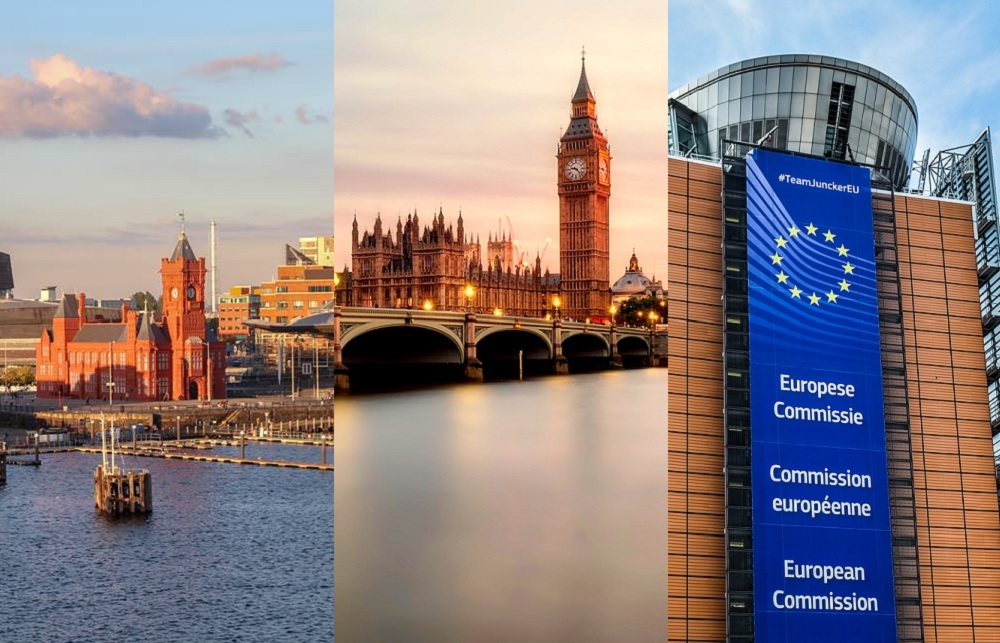Brexit: A tale of three cities that will decide Wales’ place in Europe

Adam Price AM, Plaid Cymru leader
Liz Saville Roberts MP, Plaid Cymru Westminster leader
It was the best of times, it was the worst of times. Perhaps only the second half of the opening sentence from Dickens’s A Tale of Two Cities is appropriate for our current context.
To borrow a little more from this great novel, the latest Brexit developments can be told in a tale of three cities – Cardiff, London and Brussels.
Let’s start in Cardiff, where this week the Labour Government repealed a flagship piece of Brexit legislation after coming to an agreement with the Conservatives in Westminster. The Continuity Act was a legal shield against Westminster using Brexit as cover to grab powers devolved to Wales.
On Wednesday we saw Labour repeal that legislative shield and yield 26 powers to Westminster.
UKIP and Conservative Assembly Members were falling over themselves to heap praise on Labour. In essence, these devo-sceptic parties lauded Labour for understanding the need for Brexit to supersede Wales’s devolution deal.
This is not to say that Labour is an anti-devolution party, just that the anti-devolutionists seem to think they are.
On the same day as repealing Wales’ only legislative leverage over Westminster’s Brexit trajectory, the Labour First Minister, without any sense of irony, said he will not support the Westminster Government’s Withdrawal Agreement and Political Declaration.
Of course, we sympathise with him. The failure of the Westminster Government to deliver anything close to a ‘sensible Brexit’ endangers the jobs and livelihoods of Welsh people. So why then cede powers to this very government under the cover of Brexit at the first time of asking?
A disconnect between the words and actions of government sadly fitting for this age of post-truth politics.
London
And nowhere is that game of misdirection more prevalent than in Westminster, where the Brexit crescendo has come to its latest climax.
It is, of course, salient that in all 585 pages of the Withdrawal Agreement Wales doesn’t even make a footnote. Even the 1888 Encyclopaedia Britannica – of, for Wales see England, fame – did better than that.
A Prime Minister fighting on all fronts now perpetually mixes messages in an attempt to appeal to Brexiteers and Remainers alike. No longer is no deal better than a bad deal, a bad deal is all we are going to get.
At the same time, the binary ‘deal or no deal’ choice long championed by the Prime Minister has been supplemented with the option of ‘no Brexit’. This is a thinly veiled attempt to scare Brexiteers in her own party into backing her deal for fear of their Brexit-dream dying.
The problem is, even the Chancellor can’t avoid admitting that of those three options – deal, no deal or no Brexit – it is the latter that is best for jobs, wages and future prospects.
On Wednesday we met with the First Minister of Scotland and the parliamentary leader of the SNP. United in our aspiration to find a way out of this Brexit mess, we have made clear the options – if our membership of the Single Market and Customs Union is off the table, a People’s Vote is now the only mechanism to avert an impasse.
The only remaining roadblock is Labour. The political expediency of their Brexit ambiguity is quickly fading. Without a clear Brexit policy, they are letting the Prime Minister off the hook. A Westminster Government on life-support is being given the space to recover by a Labour party heading in no discernible direction.
Brussels
Today we will see Brussels enter the limelight, as the horse-trading by European heads of government takes place to finalise Britain’s European goodbye. Issues still exist and the prospect of the agreement making it through today unscathed seems unlikely.
With an ever-diminishing chance of the deal making it through Parliament, however, Brussels’ 15-minutes of fame is far from over. Further negotiations or perhaps a cessation of the whole Brexit process is still on the cards.
On Wednesday a Plaid Cymru delegation will head to Brussels. There we will reiterate that Wales’s European future is far from over.
In the second World War, Welsh troops played a central role in liberating Brussels. One of the great Welsh intellectuals, Raymond Williams, wrote vividly about his experience of marching into the continental capital.
“As we entered Brussels in September ’44, the delirious welcome of the people seemed to become more feverish in every street”, he wrote.
The roots of our European unity run much deeper than the bluff and bluster of many Westminster politician would have you believe.
Try as they might, Brexiteers will never break the bonds of our European friendship.
This article was first published in the Sunday Times.
Support our Nation today
For the price of a cup of coffee a month you can help us create an independent, not-for-profit, national news service for the people of Wales, by the people of Wales.





